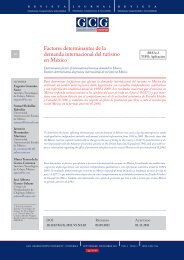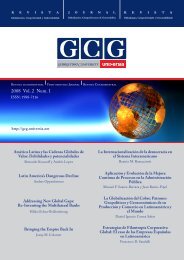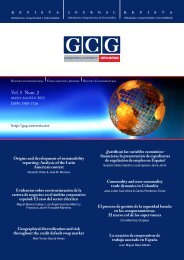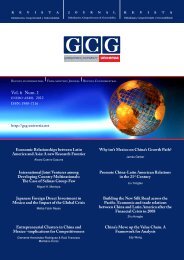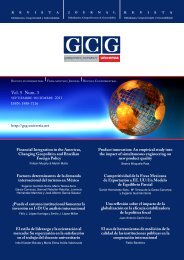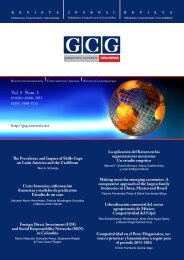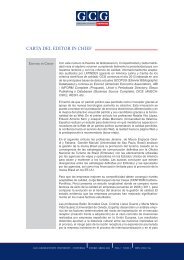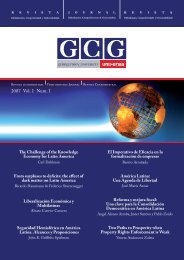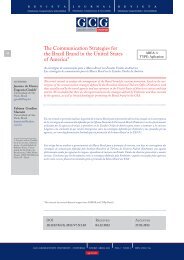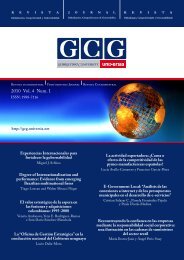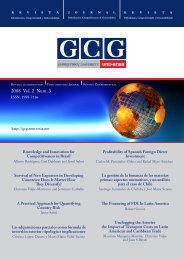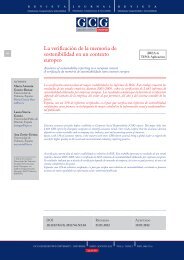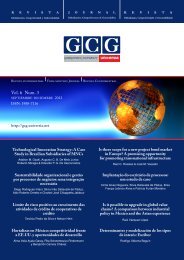2010 Vol. 4 Num. 2 - GCG: Revista de Globalización, Competitividad ...
2010 Vol. 4 Num. 2 - GCG: Revista de Globalización, Competitividad ...
2010 Vol. 4 Num. 2 - GCG: Revista de Globalización, Competitividad ...
- No tags were found...
Create successful ePaper yourself
Turn your PDF publications into a flip-book with our unique Google optimized e-Paper software.
Eduardo Ortas, José M. Moneva & Manuel Salvador6. Conclusions125The mo<strong>de</strong>rn portfolio theory asserts that SRI reduces the possibility of portfolio diversificationbecause SRI screening process reduces the investment universe. Furthermore, this theorysupport the un<strong>de</strong>r-performance of SRI compared with the traditional investment policy. Thisi<strong>de</strong>as match with supporters of the efficient market hypothesis, arguing that it is very difficultthat SRI outperform the traditional investment approach. The present research aims to testempirically if, in the Spanish market, the principles established by the mo<strong>de</strong>rn portfoliotheory are satisfied. This work aims to contribute to the literature in this field, which is mainlyfocused on assessing the risk-adjusted returns of SRI mutual and pension funds. To this end,this research aims to asses the conditional volatility, i.e. risk levels linked to investment inleading Spanish sustainability-driven companies (FTSE4Good-IBEX) and its main benchmark(IBEX35) in or<strong>de</strong>r to test if ethical investment (FTSE4Good-IBEX) shows lower risk levels thanthe traditional investment approach. Although the main objective of this research is not toasses the relative risk-adjusted return of the SRI equity in<strong>de</strong>x analysed, the estimate of theJensen’s Alpha indicates that there are significant differences in the risk-adjusted returnsachieved by the two equity in<strong>de</strong>xes analysed, the FTSE4Good-IBEX un<strong>de</strong>r-performing itsbenchmark (IBEX35). However, this effect is observed very low and could be due to thatstock markets misprice information on CSR in the short run. This result matches the resultsobtained by Le Maux and Le Saout (2004) and Schö<strong>de</strong>r (2004, 2007).One of the contributions of this work is the use of univariate and multivariate GARCH mo<strong>de</strong>lsto estimate conditional volatility levels for both in<strong>de</strong>xes, as well as to analyse their jointevolution. It seems, that, during the period analysed, the risk levels experienced by theFTSE4Good-IBEX were far lower than that of the IBEX35. This is of relevant interest becauseit is observed that investing in SRI equity indices might reduce the volatility, i.e. risk ofinvestment portfolios. This could be due to that, social and environmental screening reducesthe possibility of incurring high costs during corporate social crises, which financial marketstend to un<strong>de</strong>rvalue (Renneboog et al., 2008a). In addition, a very interesting contribution ofthis study is the observation that, especially during periods of maximum market instability,the risk levels differences between the two in<strong>de</strong>xes was the greatest. These results indicatethat, in Spanish market, the SRI equity in<strong>de</strong>x better withstand the negative effects of a marketcrash, like the initiated in mid 2008.Traditionally, it was consi<strong>de</strong>red that investors were primarily attracted to SRI vehicles outof a <strong>de</strong>sire to match their investment policies with their values (Domini, 2001). The resultsobtained from this study extend this proposition by indicating that investors can replicateSpanish SRI equity indices, satisfying their ethical values, simultaneously obtaining lowerrisk levels in their portfolios, i.e. investors may do well while doing good (Hamilton et al.,1993). The main findings show that SRI can be a good investment choice in Spain, as itpresents a novel focus via which both individual and institutional investors can diversify therisk from different portfolios through other types of unconventional financial assets, such asSRI equity indices.Given the lack of research that analyses the risk levels associated with socially responsibleequity indices (Fowler and Hope, 2007; Schrö<strong>de</strong>r, 2007), it would be interesting to extendthis analysis to other SRI stock exchange in<strong>de</strong>xes worldwi<strong>de</strong> and, furthermore, to analysethe evolution of all of these together in or<strong>de</strong>r to capture any volatility spillover effects.<strong>GCG</strong> GEORGETOWN UNIVERSITY - UNIVERSIA <strong>2010</strong> VOL. 4 NUM. 2 ISSN: 1988-7116



